| Listing 1 - 10 of 16 | << page >> |
Sort by
|
Book
ISBN: 0429906692 0429481926 1283923734 178241066X 9781782410669 1780491417 9781780491417 9781780491417 9781782410669 9780429906695 9780429481925 9781283923736 0367327988 042992092X 1781811989 Year: 2013 Publisher: London Karnac
Abstract | Keywords | Export | Availability | Bookmark
 Loading...
Loading...Choose an application
- Reference Manager
- EndNote
- RefWorks (Direct export to RefWorks)
This book presents a broad and deep symbolic reading of the characters involved in the mythical Holy Grail. The author makes several correlations between symbolic readings of the text and the subjective nature of the mythic psyche and personality development today. The Grail, Arthur and his Knights is a mythical-symbolic reading and Jungian analysis of the Grail, with its various forms, origins and manifestations. It is also about Arthur and his loyal and faithful knights of the Round Table and its dangerous chair. The Great Wounded Goddess, the Wasted Land, the Old Wise Merlin and his visions of the future are also re-examined. The book describes the archetyal themes of search, freedom, and the dreaming return of Golden Age. The symbolic reading of these themes according to the Analytical Psychology reveals a wealth of ancient wisdom, transforming the myth, in itself deeply fascinating, into a powerful metaphor for how the search of the individuation process works.
Grail --- Arthurian romances. --- Jungian psychology. --- Romances --- Analytic psychology --- Analytical psychology --- Jungian psychoanalysis --- Jungian theory --- Psychoanalysis --- Legends --- History and criticism. --- Arthur, --- Arturus, --- Artur, --- Arturo, --- Artus, --- Artù, --- Artús, --- Артур, --- Arzhur, --- Artuš, --- Αρθούρος, --- Arthouros, --- Arthur Pendragon --- Pendragon, Arthur --- Adha, --- 아서, --- 아서 왕 --- Asŏ, --- Asŏ Wang --- ארתור, --- Arthur Gernow --- Arthurus, --- Arturius, --- Arturs, --- Artūras, --- Artúr, --- アーサー, --- アーサー王 --- Āsā-ō --- Āsā, --- Èrthu, --- Arthwys,
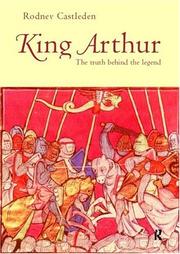
ISBN: 1134373767 0203159349 9786610333417 0203022165 9786610225262 1280333413 1134373775 1280225262 020301006X 9780203159347 9780203022160 9780203010068 9780415195751 0415195756 6610225265 9781134373772 9781134373765 9780415316552 Year: 2005 Publisher: London ; New York : Taylor and Francis e-Library/Routledge,
Abstract | Keywords | Export | Availability | Bookmark
 Loading...
Loading...Choose an application
- Reference Manager
- EndNote
- RefWorks (Direct export to RefWorks)
King Arthur: The Truth Behind the Legend offers a more complete picture of Arthur's Britain and his place in it than ever before. Its bold approach and compelling arguments will be welcomed by all readers with an interest in Arthuriana.
Britons --- Camelot (Legendary place) --- Geographical myths --- Kings and rulers --- Arthur, --- Arturus, --- Artur, --- Arturo, --- Artus, --- Artù, --- Artús, --- Артур, --- Arzhur, --- Artuš, --- Αρθούρος, --- Arthouros, --- Arthur Pendragon --- Pendragon, Arthur --- Adha, --- 아서, --- 아서 왕 --- Asŏ, --- Asŏ Wang --- ארתור, --- Arthur Gernow --- Arthurus, --- Arturius, --- Arturs, --- Artūras, --- Artúr, --- アーサー, --- アーサー王 --- Āsā-ō --- Āsā, --- Èrthu, --- Arthwys, --- Great Britain --- Antiquities, Celtic. --- History
Book
ISBN: 3110310791 9783110310795 9783110310702 Year: 2013 Publisher: Berlin De Gruyter
Abstract | Keywords | Export | Availability | Bookmark
 Loading...
Loading...Choose an application
- Reference Manager
- EndNote
- RefWorks (Direct export to RefWorks)
65 Jahre nach der Gründung der Internationalen Artusgesellschaft und nach der Formulierung des "doppelten Kursus" durch Hugo Kuhn (1948) fragt die Artusforschung nach ihrem aktuellen Stand im Kontext einer Literaturwissenschaft als Kulturwissenschaft, indem sie gezielt kulturwissenschaftliche Fragestellungen historisiert. Junge und erfahrene Wissenschaftler(innen) aus verschiedenen Ländern Europas und den USA erlauben einen Einblick in ihre laufenden Forschungsarbeiten zur Artusliteratur. Am Beispiel deutscher, französischer, portugiesischer, niederländischer und englischer Artusromane verhandeln sie zentrale Probleme aus den Bereichen der Gender Studies, der Spiritualitätsforschung, Literatursoziologie und Gewaltforschung, der Narratologie und Medienkulturwissenschaft. Gefragt wird u.a. nach der semantischen Aufladungen von Lichteffekten in der Literatur, nach der Kodierung von Sinnlosigkeit und Paradoxie, nach der Signalfunktion von Namen und nach dem Verhältnis von Gewalt und Spiritualität. In einem weiten Netz vielfältig miteinander verknüpfter Fragestellungen erweisen sie eindrücklich, welchen reichen Beitrag die interdisziplinäre Artusforschung zum Dialog über kulturwissenschaftliche Grundprobleme liefern kann.
Arthurian romances --- History and criticism. --- Arthur, --- Arturus, --- Artur, --- Arturo, --- Artus, --- Artù, --- Artús, --- Артур, --- Arzhur, --- Artuš, --- Αρθούρος, --- Arthouros, --- Arthur Pendragon --- Pendragon, Arthur --- Adha, --- 아서, --- 아서 왕 --- Asŏ, --- Asŏ Wang --- ארתור, --- Arthur Gernow --- Arthurus, --- Arturius, --- Arturs, --- Artūras, --- Artúr, --- アーサー, --- アーサー王 --- Āsā-ō --- Āsā, --- Èrthu, --- Arthwys, --- Thematology --- Comparative literature --- King Arthur [Fictitious character] --- Arthurian romance. --- comparative medieval literature. --- narratology.
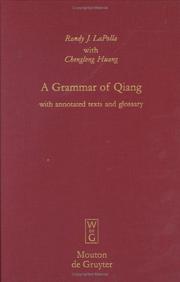
ISBN: 1282193805 9786612193804 3110197278 9783110197273 9783110178296 311017829X 311017829X 9781282193802 6612193808 Year: 2003 Publisher: Berlin Mouton de Gruyter
Abstract | Keywords | Export | Availability | Bookmark
 Loading...
Loading...Choose an application
- Reference Manager
- EndNote
- RefWorks (Direct export to RefWorks)
This book is a full reference grammar of Qiang, one of the minority languages of southwest China, spoken by about 70,000 Qiang and Tibetan people in Aba Tibetan and Qiang Autonomous Prefecture in northern Sichuan Province. It belongs to the Qiangic branch of Tibeto-Burman (one of the two major branches of Sino-Tibetan). The dialect presented in the book is the Northern Qiang variety spoken in Ronghong Village, Yadu Township, Chibusu District, Mao County. This book, the first book-length description of the Qiang language in English, is the result of many years of work on the language, and is as typologically comprehensive as possible. It includes not only the reference grammar, but also an ethnological overview, several fully analyzed texts (mostly traditional stories), and an annotated glossary. The language is verb final, agglutinative (prefixing and suffixing), and has both head-marking and dependent marking morphology. The phonology of Qiang is quite complex, with 39 consonants at seven points of articulation, plus complex consonant clusters, both in initial and final position, as well as vowel harmony, vowel length distinctions, and a set of retroflexed vowels. The grammar also is complex, with a paradigm of eight direction marking verbal prefixes, and two paradigms for person marking, one for actor, one for non-actor, and a variety of other verbal prefixes and suffixes, as well as definite and number marking on nouns. Noun phrases take classifiers and relational pospositions as well.
Khyang language --- Asho Chin language --- Asho language --- Ashu language --- Aso language --- Chin language, Asho --- Khyeng language --- Kyang language --- Qin language --- Sho language (Bangladesh and Lower Burma) --- Shoa language --- Chin languages --- Grammar. --- Grammar --- Sino-Tibetan languages
Book
ISBN: 9780708322017 9780708323861 0708322018 1299200869 0708323863 9781299200869 9781783168552 1783168552 Year: 2011 Volume: 6 Publisher: Cardiff University of Wales Press
Abstract | Keywords | Export | Availability | Bookmark
 Loading...
Loading...Choose an application
- Reference Manager
- EndNote
- RefWorks (Direct export to RefWorks)
King Arthur's stories survive in many genres, but while scholars and enthusiasts alike know something of his roots in Geoffrey of Monmouth's Latin History of the Kings of Britain, most are unaware that there was a Latin Arthurian tradition which extended beyond Geoffrey. This collection of essays highlights different aspects of that tradition.
Latin literature, Medieval and modern --- Arthurian romances --- Littérature latine médiévale et moderne --- Cycle d'Arthur --- History and criticism. --- Histoire et critique --- Arthur, --- In literature. --- History and criticism --- Arturus, --- Artur, --- Arturo, --- Artus, --- Artù, --- Artús, --- Артур, --- Arzhur, --- Artuš, --- Αρθούρος, --- Arthouros, --- Arthur Pendragon --- Pendragon, Arthur --- Adha, --- 아서, --- 아서 왕 --- Asŏ, --- Asŏ Wang --- ארתור, --- Arthur Gernow --- Arthurus, --- Arturius, --- Arturs, --- Artūras, --- Artúr, --- アーサー, --- アーサー王 --- Āsā-ō --- Āsā, --- Èrthu, --- Arthwys, --- E-books
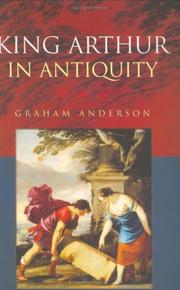
ISBN: 0415555000 0203583035 1280074116 1134372027 9780203583036 9786610074112 6610074119 9780415317146 0415317142 0415317142 9780415555005 9781280074110 9781134372027 9781134371976 9781134372010 1134372019 Year: 2004 Publisher: London New York Routledge
Abstract | Keywords | Export | Availability | Bookmark
 Loading...
Loading...Choose an application
- Reference Manager
- EndNote
- RefWorks (Direct export to RefWorks)
This original and compelling study argues against the traditional identification of Arthur as a king in Celtic Britain. Instead, Graham Anderson explores the evidence for two much older figures, known to classical writers as kings of Arcadia and Lydia, over a millenium before.
He shows how these kings can be clearly connected with traditional Arthurian characters and adventure, including an ancient Gawain, a Lady of Shallott, and a predecessor of Excalibur, and shows that the Arthurian universe found in Welsh tales and French romances is already anticipated in these earliest of Arthur
Tales --- Britons --- Arthurian romances --- Legends --- Brythons --- Celts --- Ethnology --- Folk tales --- Folktales --- Folk literature --- History and criticism. --- Kings and rulers --- Arthur, --- Arturus, --- Artur, --- Arturo, --- Artus, --- Artù, --- Artús, --- Артур, --- Arzhur, --- Artuš, --- Αρθούρος, --- Arthouros, --- Arthur Pendragon --- Pendragon, Arthur --- Adha, --- 아서, --- 아서 왕 --- Asŏ, --- Asŏ Wang --- ארתור, --- Arthur Gernow --- Arthurus, --- Arturius, --- Arturs, --- Artūras, --- Artúr, --- アーサー, --- アーサー王 --- Āsā-ō --- Āsā, --- Èrthu, --- Arthwys, --- Great Britain --- Greece --- Civilization --- Greek influences. --- History
Book
ISBN: 9780813163789 0813163781 9780813153605 0813153603 1322602697 Year: 1965 Publisher: [Lexington, Kentucky] : University Press of Kentucky,
Abstract | Keywords | Export | Availability | Bookmark
 Loading...
Loading...Choose an application
- Reference Manager
- EndNote
- RefWorks (Direct export to RefWorks)
Beginning with a consideration of Malory's ingenious chronology, this study shows that Malory achieved thematic and structural unity by selecting from the great mass of Arthurian legend three narrative strands -- the intrigues of Lancelot and Guinevere, the Grail quest, and the feud between the houses of Lot and Pellinore -- using these to illustrate a single theme -- the rise, flowering, and downfall of an ideal civilization. This selection and use of diverse materials, Charles Moorman asserts, indicates clearly that Malory set to work with a preconceived plan and that he did achieve his purp
Rhetoric, Medieval. --- Arthurian romances --- Arthur, King --- Malory, Thomas, Sir, active 15th century. Morte d'Arthur. --- LITERARY CRITICISM --- Arthurian romances. --- Literature. --- History and criticism. --- In literature. --- European --- English, Irish, Scottish, Welsh. --- Arthur, --- Malory, Thomas, --- Malory --- Morte d'Arthur (Malory, Thomas, Sir). --- Rhetoric, medieval. --- Arthur, king --- Malory, thomas, sir, active 15th century. morte d'arthur. --- Literary criticism --- English, irish, scottish, welsh. --- Arturus, --- Artur, --- Arturo, --- Artus, --- Artù, --- Artús, --- Артур, --- Arzhur, --- Artuš, --- Αρθούρος, --- Arthouros, --- Arthur Pendragon --- Pendragon, Arthur --- Adha, --- 아서, --- 아서 왕 --- Asŏ, --- Asŏ Wang --- ארתור, --- Arthur Gernow --- Arthurus, --- Arturius, --- Arturs, --- Artūras, --- Artúr, --- アーサー, --- アーサー王 --- Āsā-ō --- Āsā, --- Èrthu, --- Arthwys,
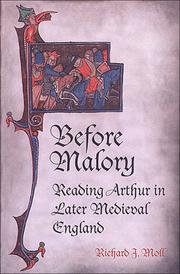
ISBN: 0802037224 9786612023231 1282023233 144267122X Year: 2003 Publisher: Toronto, [Ontario] ; Buffalo, [New York] ; London, [England] : University of Toronto Press,
Abstract | Keywords | Export | Availability | Bookmark
 Loading...
Loading...Choose an application
- Reference Manager
- EndNote
- RefWorks (Direct export to RefWorks)
"Although most modern scholars doubt the historicity of King Arthur, parts of the legend were accepted as fact throughout the Middle Ages. Medieval accounts of the historical Arthur, however, present a very different king from the romances that are widely studied today. Richard Moll examines a wide variety of historical texts to explore the relationship between the Arthurian chronicles and the romances. He demonstrates how competing and conflicting traditions interacted with one another, and how writers and readers of Arthurian texts negotiated a complex textual tradition."--Jacket.
Arthur [King ] --- Arthurian romances --- Sources --- Great Britain --- History --- To 1066 --- English literature --- History and criticism. --- Arthur, --- Malory, Thomas, --- Arturus, --- Artur, --- Arturo, --- Artus, --- Artù, --- Artús, --- Артур, --- Arzhur, --- Artuš, --- Αρθούρος, --- Arthouros, --- Arthur Pendragon --- Pendragon, Arthur --- Adha, --- 아서, --- 아서 왕 --- Asŏ, --- Asŏ Wang --- ארתור, --- Arthur Gernow --- Arthurus, --- Arturius, --- Arturs, --- Artūras, --- Artúr, --- アーサー, --- アーサー王 --- Āsā-ō --- Āsā, --- Èrthu, --- Arthwys, --- Historiography. --- Morte d'Arthur (Malory, Thomas, Sir) --- Birth, life, and acts of King Arthur (Malory, Thomas, Sir) --- Caxton's Malory (Malory, Thomas, Sir) --- Sir Thomas Malory's Le morte d'Arthur (Malory, Thomas, Sir) --- Sir Thomas Malory's Morte Darthur (Malory, Thomas, Sir)
Book
ISBN: 1283283867 9786613283863 0520948076 9780520948075 0520268164 Year: 2010 Publisher: Berkeley University of California Press
Abstract | Keywords | Export | Availability | Bookmark
 Loading...
Loading...Choose an application
- Reference Manager
- EndNote
- RefWorks (Direct export to RefWorks)
A Connecticut Yankee is Mark Twain's most ambitious work, a tour de force with a science-fiction plot told in the racy slang of a Hartford workingman, sparkling with literary hijinks as well as social and political satire. Mark Twain characterized his novel as "one vast sardonic laugh at the trivialities, the servilities of our poor human race." The Yankee, suddenly transported from his native nineteenth-century America to the sleepy sixth-century Britain of King Arthur and the Round Table, vows brashly to "boss the whole country inside of three weeks." And so he does. Emerging as "The Boss," he embarks on an ambitious plan to modernize Camelot-with unexpected results.
Knights and knighthood --- Americans --- Arthurian romances --- Time travel --- Knighthood --- Civilization, Medieval --- Nobility --- Chivalry --- Heraldry --- Orders of knighthood and chivalry --- Arthur, --- Arturus, --- Artur, --- Arturo, --- Artus, --- Artù, --- Artús, --- Артур, --- Arzhur, --- Artuš, --- Αρθούρος, --- Arthouros, --- Arthur Pendragon --- Pendragon, Arthur --- Adha, --- 아서, --- 아서 왕 --- Asŏ, --- Asŏ Wang --- ארתור, --- Arthur Gernow --- Arthurus, --- Arturius, --- Arturs, --- Artūras, --- Artúr, --- アーサー, --- アーサー王 --- Āsā-ō --- Āsā, --- Èrthu, --- Arthwys, --- Great Britain --- 19th century. --- adaptation. --- adventure. --- american lit. --- american literature. --- arthurian legend. --- arthurian. --- arthuriana. --- britain. --- classic. --- comedy. --- england. --- fiction. --- funny. --- historical fiction. --- humor. --- king arthur. --- literary fiction. --- medieval. --- modern camelot. --- modern king arthur. --- mythology. --- round table. --- satire. --- social commentary. --- speculative fiction. --- time travel. --- yankee.
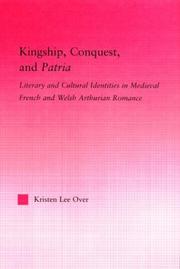
ISBN: 0203958616 1135474168 9781135474232 1135474230 9780203958612 041597271X 9780415972710 9781135474164 9781135474300 9780415852425 0415852420 Year: 2005 Publisher: New York : Routledge,
Abstract | Keywords | Export | Availability | Bookmark
 Loading...
Loading...Choose an application
- Reference Manager
- EndNote
- RefWorks (Direct export to RefWorks)
First Published in 2005. Routledge is an imprint of Taylor & Francis, an informa company.
Welsh literature --- Politics and literature --- Arthurian romances --- Comparative literature --- Kings and rulers in literature. --- Literature, Comparative --- Philology --- Literature --- Literature and politics --- British literature --- History and criticism. --- History --- Welsh and French. --- French and Welsh. --- History and criticism --- Political aspects --- Arthur, --- Arturus, --- Artur, --- Arturo, --- Artus, --- Artù, --- Artús, --- Артур, --- Arzhur, --- Artuš, --- Αρθούρος, --- Arthouros, --- Arthur Pendragon --- Pendragon, Arthur --- Adha, --- 아서, --- 아서 왕 --- Asŏ, --- Asŏ Wang --- ארתור, --- Arthur Gernow --- Arthurus, --- Arturius, --- Arturs, --- Artūras, --- Artúr, --- アーサー, --- アーサー王 --- Āsā-ō --- Āsā, --- Èrthu, --- Arthwys, --- In literature. --- Kings and rulers in literature --- French and Welsh --- Welsh and French
| Listing 1 - 10 of 16 | << page >> |
Sort by
|

 Search
Search Feedback
Feedback About UniCat
About UniCat  Help
Help News
News